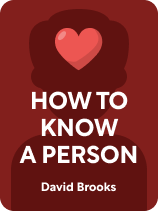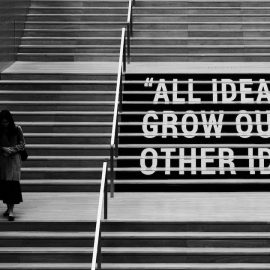

This article is an excerpt from the Shortform book guide to "How to Know a Person" by David Brooks. Shortform has the world's best summaries and analyses of books you should be reading.
Like this article? Sign up for a free trial here.
Do you struggle to carry conversations? What types of skills do you need to enliven a discussion with someone?
David Brooks says that you can have compelling, enriching conversations even with people you’re still getting to know. That’s especially true if you make a point of cultivating your conversational skills.
Check out how to improve conversational skills so you can have rich discussions with people.
Engage and Improve Your Conversational Skills
To turn everyday encounters into a chance to get to know someone better, you have to hone your ability to listen. Brooks explains that we often fail to really listen to one another, but that’s a bad habit you can break with a little bit of work.
(Shortform note: Researchers agree with Brooks that we’re not great at listening to each other. In one study, people only retained about half of what others said, despite 96% of study participants seeing themselves as good listeners. This significant gap between perceived and actual listening skills is common—but fixable. Some communication experts suggest that you can become a more effective listener by tuning out distractions and focusing entirely on your conversation partner’s words, body language, and subtle cues. You can also watch out for common barriers to good listening, like the tendency to start thinking about what to say next, to make assumptions, or to get distracted.)
Brooks recommends using active listening techniques as one way to learn how to improve conversational skills—and to signal to them that you’re really paying attention. By paraphrasing or summarizing your understanding of what you’re hearing as the other person speaks, you can check in with them and make sure you’re on the same page with them. You can also use nonverbal cues—like maintaining eye contact, leaning in when the other person speaks, and nodding your head—to show them how engaged you are. If they feel confident that you’re really listening, that can help them feel more comfortable sharing their thoughts and their perspective with you.
Even conversations about mundane topics offer you a chance to connect with someone, according to Brooks. If you can make people feel valued when you’re talking about the traffic in your neighborhood or comparing notes on the movie you both saw over the weekend, you’re well on your way to building a meaningful relationship with them.
(Shortform note: While Brooks advocates for active listening, some communication experts are less enthusiastic about these techniques. They say methods like paraphrasing and using “I” statements can hinder genuine connection. Instead, you might try reflective listening, using “you” statements to reflect what you’re hearing back to the speaker—like, “You’re saying you weren’t expecting your coworker to call you into that meeting today.” You can also try affect labeling (naming the speaker’s emotion to help them feel understood)—like, “You’re feeling frustrated your coworker sprung this on you.” Experts say these skills might be more powerful tools for improving communication than the active listening techniques Brooks recommends.)

———End of Preview———
Like what you just read? Read the rest of the world's best book summary and analysis of David Brooks's "How to Know a Person" at Shortform.
Here's what you'll find in our full How to Know a Person summary:
- The benefits of really getting to know other people
- How to better understand people on a personal level
- Why our morality and relationships are in a crisis






